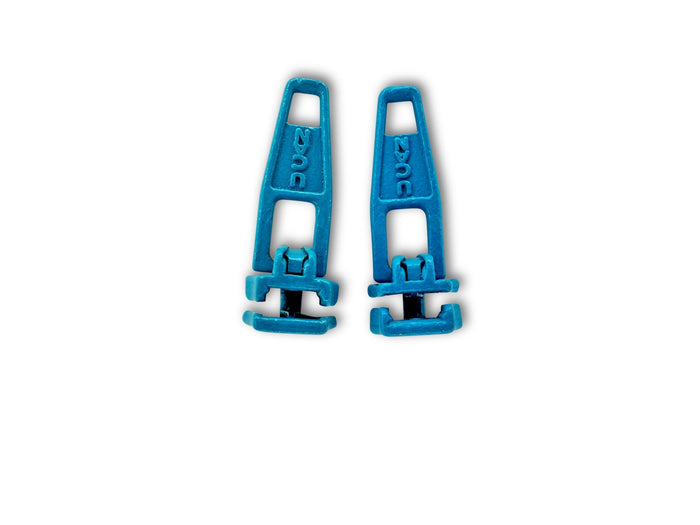Standard vs. Reverse Bale Slider for Nylon Coil Zipper: What's the Difference?
Posted Monday, February 24, 2025

When shopping for zipper components, you might come across terms like "reverse bale" or "reverse coil" sliders. Or you might see “RC” written on the back of a slider. Understanding the difference between standard and reverse bale sliders can help you choose the right components for your project and achieve your desired aesthetic. Let's explore what makes these two slider types distinct and how they affect the appearance and function of your zippers.
The Basics: Same Chain, Different Look
The most fascinating aspect of standard versus reverse bale sliders is that they can completely transform the appearance of the same zipper chain. Using identical nylon coil zipper chain, attaching a standard slider creates a typical zipper look, while a reverse bale slider creates what's often referred to as an "invisible" zipper look.
Identifying the Difference
How can you tell these sliders apart? It's all in the structure:
Standard Sliders: When examining a standard slider, you'll notice the top portion has a U-shape, while the bottom is flat. This design accommodates the raised coil teeth that face upward on standard zipper installations.
Reverse Bale Sliders: These sliders have the opposite configuration - the bottom has a U-shape, and the top is flat. This inverted design allows the slider to be attached with the coil teeth facing downward.
Installation Orientation
The key to understanding these two slider types is recognizing how they interact with the zipper chain:
- With a standard slider, the coil teeth face the front of the slider, creating the traditional zipper appearance where teeth are visible.
- With a reverse bale slider, the coil teeth face the back side of the slider, resulting in a cleaner look where the teeth are less visible from the front.
Creating a Reverse Coil Zipper
When you attach a reverse bale slider to nylon coil zipper chain, you're creating what's known as a "reverse coil zipper." While not a true invisible zipper (which is a different type altogether), a reverse coil zipper has a sleek, hidden-teeth appearance that many designers prefer for certain applications.
The installation process differs slightly between the two:
- For standard sliders, feed the zipper chain with the coil teeth facing the front of the slider
- For reverse bale sliders, feed the chain with the coil teeth facing the back of the slider
Practical Applications
Reverse coil zippers aren't just about aesthetics - they serve practical purposes as well. You'll commonly find them on jackets, outdoor bags and backpacks, luggage, coolers and many other products where protecting the coil teeth from exposure to the elements is desirable.
The reverse configuration effectively shields the zipper teeth, providing an additional layer of protection against dirt, moisture, and wear.
How to Recognize Reverse Coil Zippers
If you're examining a product and can't readily see the zipper teeth, chances are you're looking at a reverse coil zipper created with a reverse bale slider. This "invisible" appearance is the hallmark of this zipper configuration.
Choosing the Right Slider
When selecting components for your zipper projects, consider both the aesthetic and functional aspects of your choice:
- Standard sliders offer the classic zipper look with visible teeth
- Reverse bale sliders provide a cleaner, more streamlined appearance with hidden teeth
Both work with the same zipper chain, just attached in different orientations
Understanding the difference between these two slider types gives you more creative control over your projects and allows you to make informed decisions based on both appearance and durability needs.
Whether you're repairing an existing zipper or creating something new, knowing how to identify and work with both standard and reverse bale sliders is an essential skill for anyone working with zippers.



















